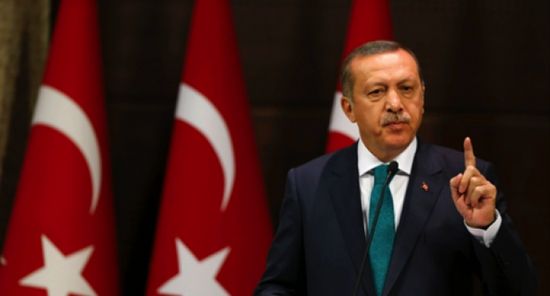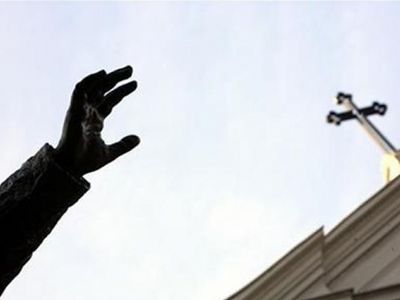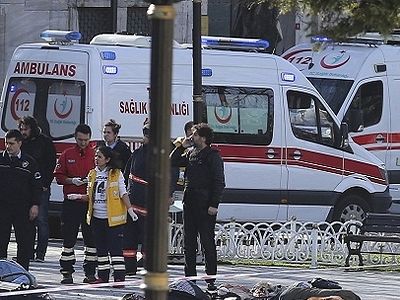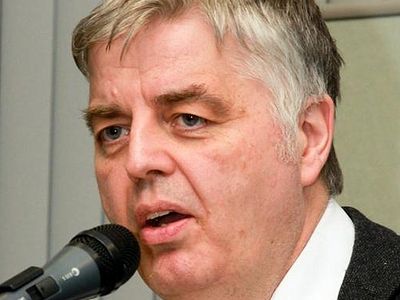Source: PJ Media
October 7, 2016
A total of 8,985 mosques were built between 2005 and 2015 by the Turkish government over the last decade in Turkey, according to statistics released by Turkey’s Religious Affairs Directorate (Diyanet).
The Central Anatolian province of Konya contained the highest number of mosques, Dogan News Agency reported on Sept. 16. Ankara, the southern province of Antalya, the Black Sea provinces of Ordu and Trabzon, and the southeastern province of Diyarbakır were among the other provinces with over 2,000 mosques.
While the Turkish government has built so many mosques across the country with state funds, it has banned Orthodox Christian liturgy in the Sumela Monastery, a historic site in Trabzon.
Sumela Monastery, located in the district of Macka -- or Matsuka in Greek -- in Trabzon province is one of the oldest monasteries in the Christian world. According to records, it was built by two Athenian monks, St. Barnabas and his nephew St. Sophronios, and was inaugurated by the bishop of Trabzon in 386 A.D.
The province of Trabzon, located in the ancient region of Pontos, the northeast portion of Anatolia adjacent to the Black Sea, also has a long Greek and Christian history. The word “Pontos” means “sea” in Greek.
“Trabzon was settled by Greeks probably by the 7th century BC,” writes researcher Sam Topalidis for the website Pontos World. “Trabzon was the ancient capital of the Greek speaking Komnenos Byzantine Kingdom (1204–1461). It survived until 1461, eight years after the fall of Byzantine Constantinople when both localities fell to the Ottoman Turks.”
After the city’s invasion by the Ottoman Turks, the local demographic began to change; but for centuries, Christians were the majority in the city.
According to Topalidis, Trabzon’s Muslim population increased dramatically under the Ottoman rule due to:
- Muslims moving into the city (Most of the Trabzon’s Muslims were involuntary immigrants)
- Deportations of Christians out of the city, probably to Istanbul
- Christians converting to Islam, probably for fear of deportation
“However, the most important reason for the conversions was probably due to the higher taxes paid by Christians (compared to Muslims), a strong economic incentive for the poorest Christians,” writes Topalidis.
The tax he refers to is the “jizya tax” -- money paid by Christians and Jews in order to be allowed to survive and to keep practicing their religion, according to Islamic law.
Prior to the Pontian (or Pontic) Greek genocide that started in 1914, at least 43% of Trabzon’s population was still Christian: Greeks, Armenians, and a small minority of Catholics.
During the 1914-1923 Pontian Greek Genocide by the Muslim Turks, “out of approximately 700,000 Pontian Greeks who lived in Turkey at the beginning of World War I, as many as 350,000 were killed, and almost all the rest had been uprooted during the subsequent forced population exchange between Greece and Turkey. This was the end of one of the most ancient Greek civilizations in Asia Minor.”
Even after 102 years, Turkey still denies the Pontian Greek genocide.
The Sumela Monastery in the city was also closed for prayers until 2010 when, for the first time since the founding of the Turkish republic in 1923, Orthodox Christians were allowed by the Turkish government to celebrate mass on August 15.
Bartholomew I, the current archbishop of Constantinople and ecumenical patriarch, led the service, which was held in honor of the Assumption of Mary, a Christian sacred day. Orthodox bishops from Australia, Ukraine, the United States, Greece, and Georgia traveled to Sumela to participate in the mass, according to Turkish newspaper Hurriyet.
But this year, the Turkish authorities suddenly banned Christian liturgy for the Feast of the Assumption in the monastery.
The authorities notified the Ecumenical Patriarchate that the license for the yearly mass at Sumela Monastery has been revoked for this August.
According to the site Greek Reporter:
The ban has caused great disappointment to thousands of Pontian people worldwide, and people from Greece who had planned to travel to the region these days to celebrate the Feast of the Assumption.
Sources within the Patriarchate of Constantinople, who prefer to remain anonymous, and many Pontic Greeks believe that the construction’s “static problems” invoked is a pretext and they fear that Christian mass will never be allowed in the historic monastery again.
This arbitrary ban seems to be yet another demonstration of the “unofficial” second-class status of Christians in Turkey.
As the scholar Robert Spencer puts it:
That the Greek Orthodox need special permission to celebrate divine services in any of their churches in what is now Turkey is a dark reminder of the Islamic oppression of Eastern Christians from the mid-7th Century to today, and for the Greeks, especially from the Muslim conquest of Constantinople in 1453 through the defeat of the Ottoman Empire by the Western Powers during World War I.
Today, Greek-speaking Orthodox Christians are a tiny, dwindling minority in Turkey -- around 2,500 people -- and the community routinely faces discrimination.
“Christians are certainly seen as second-class citizens,” Walter Flick, a religious expert with the International Society for Human Rights in Germany, told the publication DW. “A real citizen is Muslim, and those who aren't Muslim are seen as suspicious. Christians aren't equal. They don't have full rights.”





